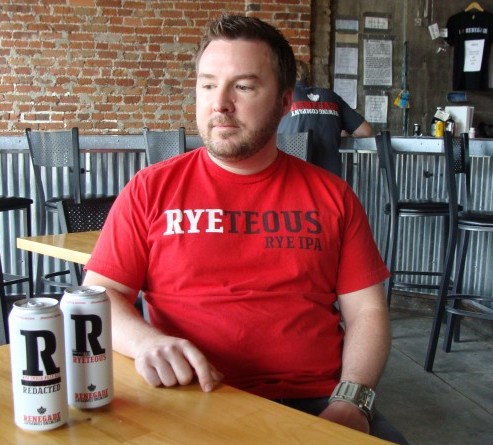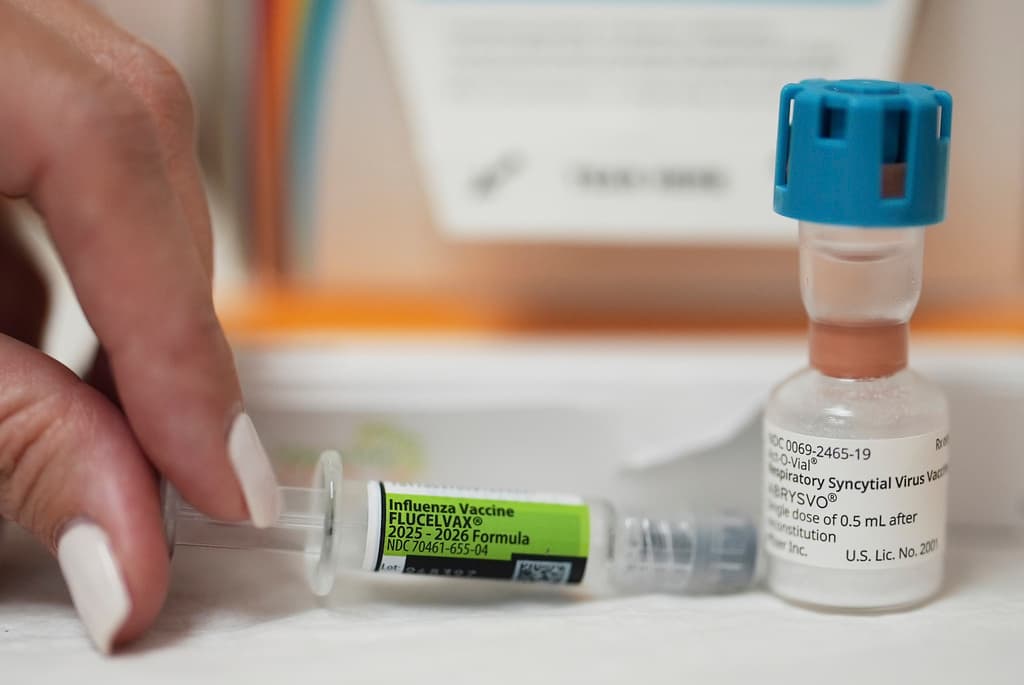
Brian O'Connell of Denver's Renegade Brewing shows off the new design for his renamed beer, Redacted. [Photo: CPR/MVerlee]
Starting this month, fans of Renegade craft brewery in Denver will have to look for its signature beer under a new moniker. The name change is a result of the kind of trademark dispute that’s becoming more and more common in the craft beer world.
[Scroll down to read Megan's story]
[Correction: An earlier audio version of this story stated that nationwide expansion is "beyond O'Connell's wildest dreams." That was an overstatement; O'Connell has no concrete plans for expansion, but would like to move into larger markets at some point in the future.]
******
The trouble started around the same time Renegade began canning last year, a move designed to bring the brewery new markets and new attention. The first beer the company packaged was its flagship brew, Rye-teous, a rye-based IPA.
When he was naming Rye-teous, Renegade's founder, Brian O’Connell, thought the pun was a clever idea. In fact, it turned out to be such a clever idea that someone else had already thought of it, several years earlier.
"I was contacted by Sixpoint Brewery in Brooklyn. They had a beer under the name, Righteous, also a rye IPA," said O'Connell recently, sitting in his tap room on a quiet morning.
The beer names are spelled differently, and they're distributed thousands of miles apart, so O'Connell called the brewery, sure they could work something out.
Instead, he said, "we finished our phone conversation and basically they followed it up with a cease and desist letter from an attorney."
In a statement, Sixpoint’s management team points out that the company had to defend its trademark or risk losing it under federal patent rules. They say they thought the situation had been worked out amicably and had warned O'Connell in advance that the cease and desist letter was coming as a legal formality.
While Sixpoint had the legal higher ground, O’Connell has used the renaming of his beer to make a statement about trademarks. He’s stuck with the same design for the cans, only with a black bar now blocking out the old name. The new name, Redacted, is printed below.
"It was definitely not an easy decision for me," O'Connnell says about the name change. "The name Rye-teous was becoming synonymous with the name Renegade and we were definitely known for this beer."
An Industry Built on Creativity
It only takes a few minutes perusing the shelves at a well-stocked liquor store to realize that creative labels are a big part of the craft beer identity. Companies promote brews with names like Puppy’s Breath Porter, Smooth Hop-erator, Hazed and Infused. It's a seemingly endless assortment of puns, pop-culture references, and inside jokes.
But it turns out the linguistic possibilities aren’t quite as limitless as you might think. As the industry has taken off in recent years, craft brewers are starting to have to worry as much about trademark infringement as fermenting schedules.
"It’s shocking how many times you think you’ve come up with a creative name and you think, man this is awesome, and you go online and some other brewery’s used it, winery’s already trademarked it," said Douglas Reiser, a beverage attorney who recently opened a small brewery in Asheville, North Carolina.
Reiser says trademark disputes make up more and more of his business these days, so he warns clients to be proactive.
"When I talk to brewers, maybe the first thing I say to them is, 'hey, we can get you licensed, but, let’s talk about branding,'" he said, "and it is really the most important first legal step that you probably take as a brewer."
But starting a brewery is already an expensive process, and brewers don’t always think to budget for the legal fees to register and defend trademarks, an oversite that can lead to a lot of trouble down the line.
For some who've been a part of craft brewing since its early days, all of this legal wrangling goes against the spirit of the industry.
"One thing the craft beer industry really prides itself on is working together," said Steve Kurowski with the Colorado Brewers Guild. "Breweries get together and brew beer together. They go to beer festivals and tastings together. So it is unusual to see some of this sort of action go on in our industry when we’re so used to such a collaborative environment."
A Legendary Story with a Different Ending
Not all of these disputes end up with lawyers and hurt feelings, though. Some in the industry have found ways to make overlapping names work for both brewers.
At the Avery taphouse in Boulder, customers, many of them fresh from running the Bolder Boulder race, belly up three deep at the bar less than an hour after opening.
Several years ago, founder Adam Avery discovered he and a California company, Russian River, were both making beers called Salvation. Instead of calling lawyers, the two brewers decided to work together. They named the resulting beer Collaboration Not Litigation.
Others in the industry point to this story as the poster child for how breweries should settle disputes. But Avery himself doesn’t see it that way. He understands why people sometimes call in lawyers.
"It’s not just a bunch of homebrewers any more run amok," said Avery. "There’s a lot of money invested, and so people want to protect what’s theirs and a name can be huge. I just hate it when it gets contentious. It’s like, you know, if someone owns the copyright to it, you should probably stop using the name if they don’t want you to."
Avery has started giving many of his beers Latin names. With the field for English-language beer names getting ever more crowded, turning to a dead tongue might be a wise choice.
[Photo: CPR/MVerlee]









